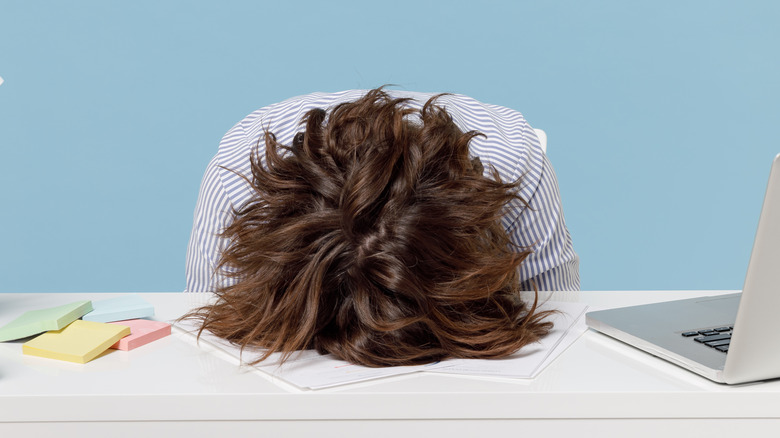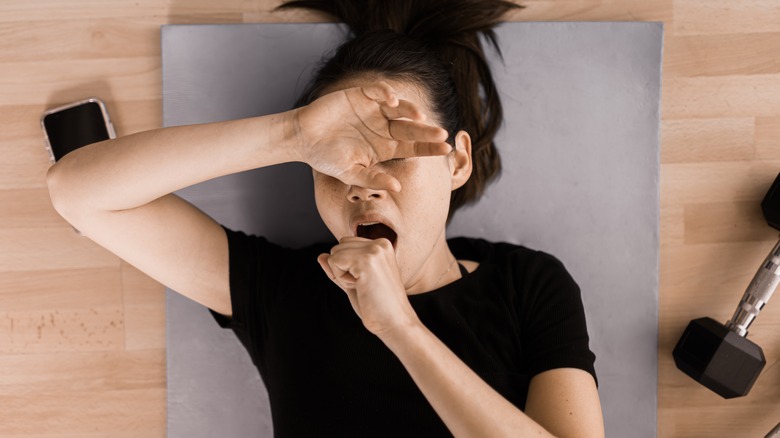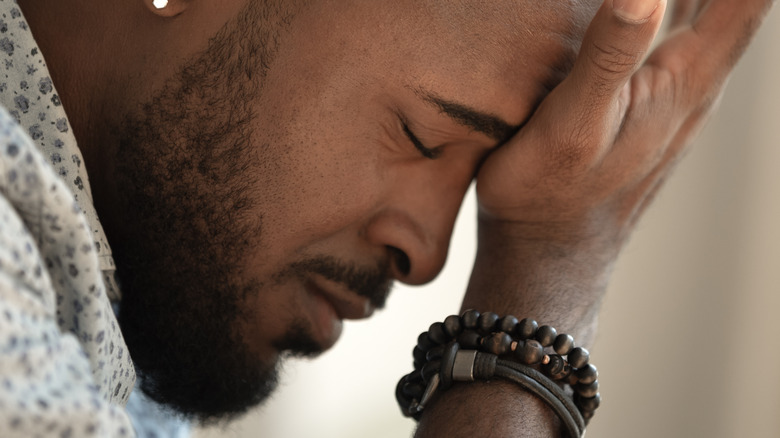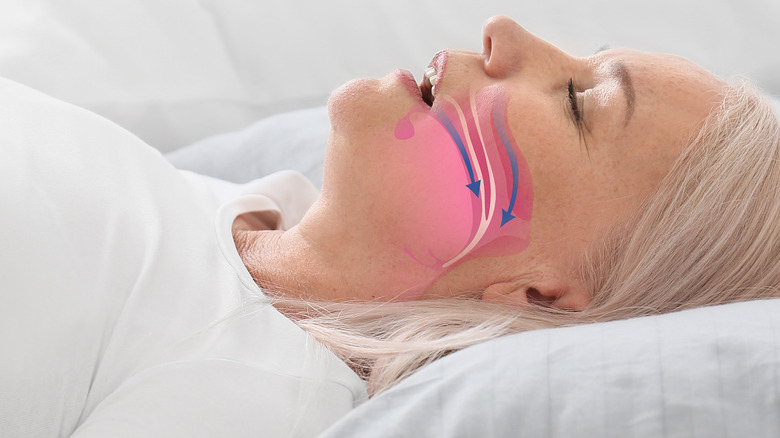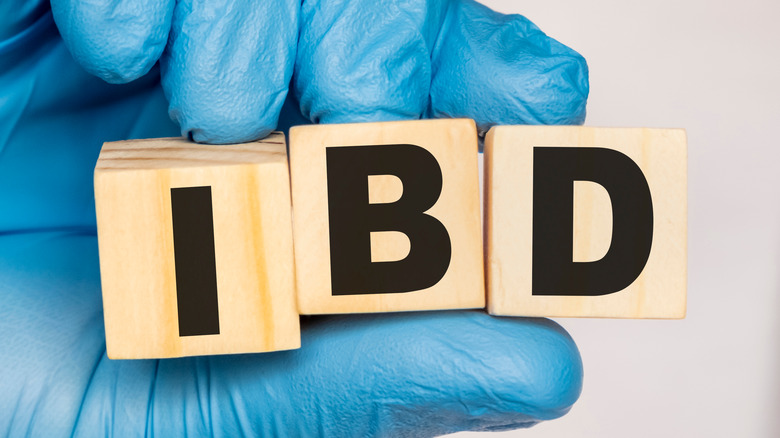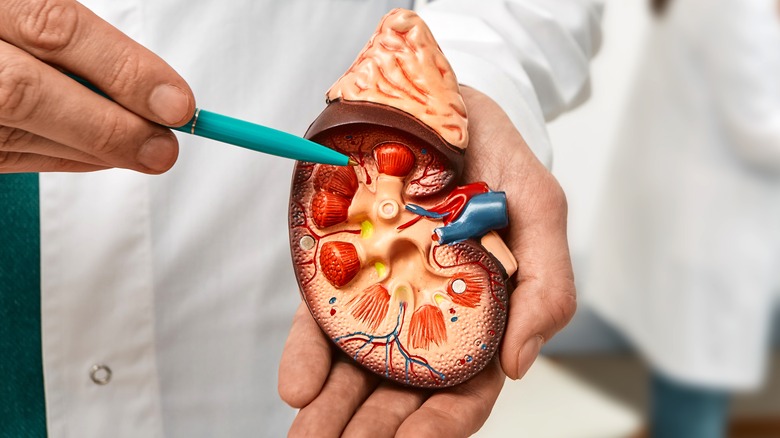Medical Reasons You Could Be Tired All The Time
We all have those days when we just... can't. From taking a Herculean effort to drag ourselves out of bed to barreling through our work day, counting the minutes until we can put our feet up, those days of the week when we feel completely exhausted can strike at unexpected times.
Yet for a lot of people, feeling tired throughout the day is a way more common occurrence than one would expect. In fact, according to a YouGov survey, almost half of all Americans stated that they feel worn out one to three days of the week, despite getting the recommended 7-8 hours of sleep a night (via Statista). And over a quarter of folks feel tired even more than that, struggling to stay awake when out of bed for four or more days per week. What gives?
Aside from life just generally being a bit much sometimes, there could be other reasons why people are feeling tired persistently. The amount of sleep you get can have a powerful effect on your energy levels, naturally, and other lifestyle factors like exercise levels or alcohol use could cause you to feel less vigorous (per the Mayo Clinic). But sometimes, that tiredness you're feeling isn't being caused by something you're doing, but by a medical condition that may need addressing. We've got some of the health-related reasons why you could be tired all the time, right here.
It could be because of an iron deficiency
Our bodies require a delicate balance of vitamins, minerals, and nutrients to maintain good health, and not getting enough of something can cause a notable knock-on effect. In the case of iron, a deficiency in the mineral (or simply not consuming adequate amounts in your diet) is indicated by feeling pretty fatigued a lot of the time (per Healthline).
One of iron's primary functions is to help our bodies make hemoglobin, and this hemoglobin facilitates the healthy circulation of oxygen in our bloodstream. Oxygen provides our body parts with energy, but when it's not circulating properly, it means that less of it's getting around, resulting in tiredness.
When we don't have enough oxygen in our muscles, it also creates additional pressure on the heart and circulatory system to make sure it gets around our bodies. This additional energy expenditure can wear us out even more. You should keep track of your iron levels, both from food and from supplementation, if you're worried about not getting enough. Adult women between 19 and 50 should try and get around 19 milligrams per day, whereas adult men should aim for 8 milligrams daily, says WebMD. Pregnant people should try and get even more than that — around 27 milligrams daily, ideally.
You could be overtraining
It's hardly a medical secret that working out is going to wear you out. But there's a big difference between hitting the gym a little too hard once or twice and feeling tired after, and feeling tired consistently due to exercise. If you're feeling exhausted all the time, it might be worth examining your workout regimen, as general fatigue is a key sign of overtraining syndrome (per the Hospital for Special Surgery).
Overtraining syndrome occurs when you overexert your body through continuous exercise and end up causing a reduction in performance ability, according to research published in Managing Sports Injuries. Alongside feeling tired all the time, the symptoms of overtraining syndrome can be pretty unpleasant, from muscle pain that doesn't fade as it normally would following exercise, to losing sleep and feeling more stressed or depressed, to a reduction in your immune system's effectiveness.
It's important to remember that overtraining syndrome is serious, and when you're exhibiting these symptoms, your body is likely telling you that you need to pare back on your exercise. Ensure that you're pairing any exercise you do with adequate recovery time, eat healthily and well, and if you're finding it difficult to pull back on your workouts, contact a healthcare professional.
Fibromyalgia can cause fatigue
Tiredness can often be triggered by a short-term condition that will pass in time, but it may also indicate something chronic. And if your fatigue is accompanied by pain throughout your body, it may be a sign of fibromyalgia, as the NHS states.
The tiredness that fibromyalgia causes is often a result of sleep disturbances, and can vary significantly in severity, from just feeling a little worn out to extreme fatigue where it's difficult to do much at all. This more severe tiredness can often appear without warning, and a drastic change in your energy levels may follow.
Alongside the tiredness that fibromyalgia causes, managing the pain that the condition prompts is vital, and your doctor may prescribe a combination of medicine and physical exercise. Certain medications, like antidepressants, can help you get better sleep and may improve your tiredness levels. It's also important to become aware of what might trigger your fatigue and avoid specific things, like dietary choices or situations that are more stressful, says Healthline. A good bedtime routine is also paramount to ensuring that you get good-quality sleep to combat your tiredness.
Tiredness can be a symptom of diabetes
Both type 1 and type 2 diabetes have many symptoms in common, with mood changes, increased thirst, unintentional weight loss, and increased susceptibility to infection being just some of them (per the Mayo Clinic). But tiredness is also a major sign you want to watch out for.
Fatigue in people with diabetes can often be a result of fluctuations in blood sugar, as Medical News Today points out. When there isn't enough insulin in our system, our cells find it difficult to draw glucose from our blood to keep them energized. This can result in two things: too much blood sugar in the system and lower energy levels.
Fatigue may also occur as a result of having too little blood sugar in people with diabetes, and even after your balance is restored, you may have a sense of residual tiredness. Other symptoms that people with diabetes have, like urinating more often or feeling hungry, can prompt fatigue, not least because they may disturb your sleep and cause you to feel more groggy in the morning. If your tiredness is accompanied by other symptoms of diabetes, it could be time to have a chat with your doctor — and if you have diabetes already, it may be useful to speak to them about your fatigue, so they can help you manage it.
Your thyroid could be making you feel tired
For such a small part of the body, the thyroid does a lot. This gland, located in the neck, is responsible for the production of key hormones that control metabolic functions, with everything from weight to heart rate being dictated by them (per WebMD). But now and again, thyroids can become a little less active, and when this happens, fatigue can strike.
Hypothyroidism — or when the thyroid creates too little hormone — affects older people and women most frequently, and results in decreased energy production throughout the body, says WebMD. And when this happens, one's energy levels can suffer significantly, leading to increased lethargy and tiredness.
If you have hypothyroidism, consult with a healthcare professional about treatment, as ignoring it can increase your chances of developing chronic conditions like stroke or a heart attack. Hypothyroidism can be difficult to spot, as its symptoms can often just be chalked up to getting older. But if you spot other symptoms like constipation or increased bowel movement frequency, mood changes, difficulty recalling memories, or tremors, it's important to investigate.
Your tiredness may actually be chronic fatigue syndrome
It's all too easy to chalk tiredness up to something else. But in certain cases, your fatigue may not be a symptom of another medical condition, but a condition in itself.
Chronic fatigue syndrome (or CFS) affects up to 2.5 million Americans, according to the CDC. It is characterized by extreme, persistent fatigue that doesn't go away by simply resting. People with chronic fatigue syndrome may experience both physical and mental fatigue, and this can be made worse by any degree of exertion, says the Mayo Clinic.
It's still unclear exactly why chronic fatigue syndrome occurs, and it could be the case that it's prompted by another condition in the first instance, like a viral infection or an injury. As CFS doesn't have a cure, the focus should be on symptom management, with medication prescribed to alleviate pain associated with the condition or knock-on mental effects like depression or lack of sleep that may contribute to your tiredness. Counseling may also be an avenue for treatment, and it may also be beneficial to find support services in your area or online to talk your condition through with other people who have CFS.
Sleep apnea could be why you're tired
Are you noticing that when you wake up, you're not quite as refreshed as you should be? Confusing, right? You did everything right, you got your eight hours, you made your bedroom into a veritable palace of comfort and tranquility, and you didn't touch a drop of alcohol or eat too late ... So what gives? Well, it could be the case that your sleep is becoming disrupted without you even realizing it, through sleep apnea.
A common condition (but one that can be difficult to spot), sleep apnea occurs when your airways shut briefly during the night, and the resultant loss of breath makes you sleep lighter or wake up entirely, according to the Sleep Disorders Center director Jose Mendez (via Everyday Health). This can leave you feeling really, really, really tired during the day, as well as being more hungry, more irritable, and "making you more susceptible to illnesses, such as colds and other viruses," Mendez says.
The good news, though, is that once your sleep apnea has been diagnosed, simple changes can make a world of differences. Lifestyle and diet changes can alter your sleep habits dramatically, and may improve your feelings of tiredness rapidly. If you're concerned about having sleep apnea, contact your doctor to book an apnea test.
It may be pointing to inflammatory bowel disease
Our bodies are a complex mass of different parts and organs working together. But changes and conditions in one section of our bodies can affect our entire system pretty dramatically. Such is the case with inflammatory bowel disease (or IBD), a condition that affects the gastrointestinal tract, but which includes fatigue as one of its main symptoms (per the CDC). IBD is characterized (as you might expect from its name) by inflammation of the large intestine, rectum, and/or colon, and as the body fights this inflammation, it can cause feelings of extreme tiredness, as the Chron's & Colitis Foundation discusses.
Inflammation in the GI tract can also have a range of further effects, such as vitamin and mineral deficiencies that can prompt fatigue. People with IBD can also have significant sleep disruptions thanks to their condition, which can result in them feeling drowsier during the day. Medications taken by people with IBD could also contribute to their feelings of tiredness. Other symptoms of inflammatory bowel disease are gastrointestinal.
If your fatigue is accompanied by diarrhea or blood in your poop or persistent stomach pain, it's important to ask your doctor if a test is necessary.
Your tiredness might be because of depression
While we can often assume that tiredness is a result of our physical health or condition, we shouldn't write off the impact that our mental health can have on our energy levels.
If you're feeling tired regularly, it may be a symptom of depression, according to Medical News Today. For people with major depressive disorder, fatigue is incredibly common, with over 9 out of 10 people experiencing it, per research published in CNS Drugs. This fatigue can often be profound and may leave you struggling to get through simple tasks, like getting out of bed and brushing your teeth. Depression can also disrupt sleep, or prevent whatever sleep you do get from being invigorating and restorative. Another problem is that fatigue can also worsen depression, creating a negative cycle of symptoms.
While certain changes to your lifestyle (such as a healthy diet and regular exercise) could somewhat alleviate symptoms of depression like fatigue, keep in mind that depression is a very real condition, and adapting your behavior may not be enough to treat it. If you or someone you know is experiencing depressive symptoms, it is important to seek help urgently.
If you or someone you know needs help with mental health, please contact the Crisis Text Line by texting HOME to 741741, call the National Alliance on Mental Illness helpline at 1-800-950-NAMI (6264), or visit the National Institute of Mental Health website.
Kidney disease may cause tiredness
Kidney disease is common, but it can be difficult to spot. "There are a number of physical signs of kidney disease, but sometimes people attribute them to other conditions," says National Kidney Foundation chief medical officer Joseph Vassaloti (via the National Kidney Foundation). In fact, these symptoms may not even show up until your kidney disease is already advanced.
If you're experiencing unexplainable fatigue, your kidneys may have something to do with it. When your kidneys aren't working as well as they should, your blood doesn't get cleared of the impurities that the organs normally tackle so well, and this results in increased tiredness and mental fog. Kidney disease can also cause knock-on conditions like anemia, of which tiredness is a key symptom. You should also be on the watch for other symptoms if you suspect that you have kidney disease, like increased urination, difficulty sleeping, puffiness or swelling around your eyes, ankles, and feet, and more frequent cramping in your muscles.
If left untreated, chronic kidney disease can lead to some profound health complications, like heart disease, end-stage renal disease, and an increased likelihood of all-cause mortality, according to the National Institute for Health and Care Excellence.
Medication for an existing condition could make you sleepy
If you already have a medical condition that you're treating with medication, you might be surprised when you start to experience more symptoms. But it's true: Taking certain medications can induce tiredness — it's actually pretty common, and it can happen thanks to a range of different drugs (per Harvard Health Publishing).
Medications as commonplace as antihistamines and antidepressants can make you feel more tired, and prescription pain medicines may also provoke drowsiness. But while these types of medication are slightly more well known for their yawn-inducing nature, there's a huge array of drugs out there — including beta blockers to control blood pressure, anticonvulsants, and even Parkinson's medications — that do the same thing.
Sometimes, this can be easily fixed. "Resolving the drowsiness may simply be a matter of adjusting the dose or changing the medication that's causing the drowsiness," states Massachusetts General Hospital pharmacist Laura Carr. Other times, your medications may make you more tired thanks to other lifestyle factors (like taking them alongside alcohol or getting poor sleep), which then exacerbates your symptoms. It can be worth considering with your pharmacist whether it's possible to take your medication when you want to be sleepy, like before bed, or if there are alternatives that you can take if it's affecting your day-to-day activities.
Fatigue can be caused by inflammation
At some point, we all experience inflammation in our bodies, whether it's by stubbing our toes or scratching our arms too roughly. But low-grade inflammation, which exists in people who have a range of chronic conditions, is harder to notice — and it may be making them more tired without them realizing it (per Eating Well).
When we experience inflammation, our bodies snap into action and release substances known as cytokines, which are meant to quell the response. Here's the problem: When cytokines are continually released (for example, when people have persistent inflammation), they continually interact with the nervous system, creating fatigue that just doesn't quit.
Moreover, chronic low-grade inflammation doesn't just happen for people who have pre-existing conditions. As many as four in ten people with no medical conditions could be affected by inflammation-related fatigue, with the inflammatory response prompted by their lifestyle and habits. One of the best ways to tackle this is by adjusting one's diet (e.g., incorporating more anti-inflammatory foods high in antioxidants and healthy fats like omega-3 into one's meals). It's also a good idea to go for gut-friendly probiotic foods like yogurt, kimchi, and other fermented products.
It could be because of stress
Sometimes, your tiredness really is what you think it is. And if you're attributing your exhaustion to just having a little too much on your plate, well, you might be right. What's vital to remember though, is that stress isn't just feeling a little irate or overwhelmed. It can be a pretty serious thing in and of itself, and is even associated with health conditions like cardiovascular disease, depression and anxiety, and gastrointestinal difficulty (per Everyday Health).
Stress can also prompt you to feel pretty darn tired. According to research published in BMC Psychiatry, fatigue is commonly experienced alongside stress, particularly in workplace-related stress. Stress can also prompt insomnia or difficulty sleeping, and when this occurs, you're far more likely to be tired throughout the day, Healthline says. If your stress is associated with depression, this may also make you feel more tired, with fatigue being a common symptom of the mental health condition.
People who are experiencing regular stress may want to examine how they can reduce or eliminate its sources in their lives. They can also try to adjust their habits to diminish or ease stress, like reducing the amount of time they spend watching the news or practicing meditation.
What can I do if I'm tired all the time?
If you're feeling fatigued persistently, the natural response might be to just try and get more sleep. (Oh, how we wish it was that simple.)
When your tiredness is caused by a medical condition, the first thing to do is try and treat that condition, as this may help to alleviate the problem. Having said this, there are a few ways to improve your energy levels around specific medical factors.
One of them is trying to get better-quality sleep, of course: Getting enough hours of sleep every night, creating a consistent sleep schedule, and carving out time before bed to wind down can all help, says the NHS. But other changes might be slightly less instinctive. Getting more exercise, for example, might seem like it's just going to wear you out even more, but consistent exercise can actually provide you with more energy, even if you're just doing small amounts. It's also worth considering your eating habits. If you're prone to leaving large gaps between meals, you may simply not be supplying your body with enough energy regularly, thereby making you more tired.

